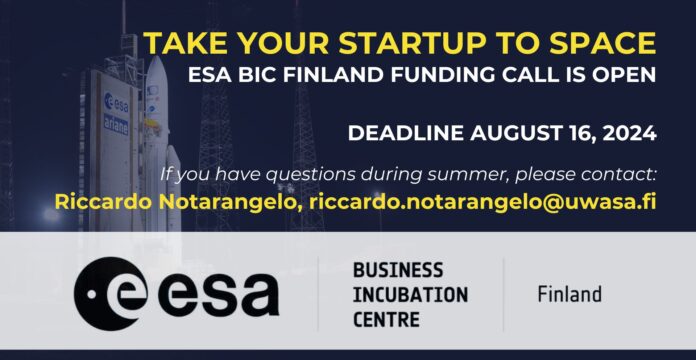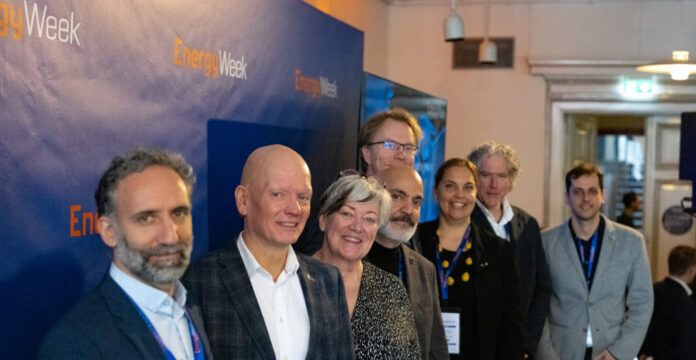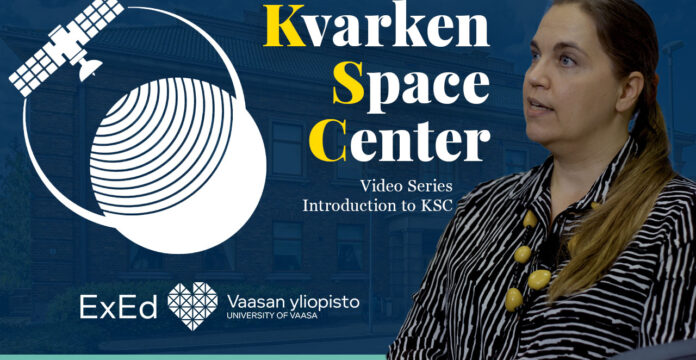monthly profile of what VSA´s space experts are working on
Research Features
Summer Spotlight on a Star, Cem Özcan 🌠

The Earth Observation Expert
Our summer edition´s #ResearchFeatures this month is Cem Özcan. Research Features is a monthly update intended to highlight who our near-Earth space experts and researchers are and a brief look into what space research they’re working on and its significance.
As a doctoral researcher and programmer in the Digital Economy Platform at the University of Vaasa, Cem Özcan leverages remote sensing, GIS, and earth observation technologies for environmental monitoring and mapping. His work is closely aligned with the evolving European sustainability rating standards (ESRS) and Environmental, Social, and Governance (ESG) reporting.
Cem’s research focuses on how remote sensing can be effectively utilized within the framework of ongoing and upcoming ESRS and ESG regulations. This approach aims to achieve transparent and robust environmental monitoring, addressing the critical challenge of discrepancies between company-reported environmental values and independently reported environmental scores.
Building upon his expertise, Cem is actively involved in projects such as KvarkenData, Spacecasting, and AuroraSpace. These initiatives demonstrate the practical applications of his research in real-world scenarios, contributing to the advancement of earthobservation technologies and their integration into regulatory frameworks.
Collaborating with institutions across Nordic countries, including partnerships with the Finnish Meteorological Institute (FMI) and counterparts in Norway and Sweden. This cross-border cooperation enhances the scope and impact of his research, fostering a more comprehensive approach to environmental monitoring in the region.
The potential impacts of Cem’s work are far reaching. By developing methods to harmonize remote sensing data with sustainability reporting standards, his research has the potential to significantly improve the accuracy and reliability of environmental assessments. This could lead to more informed decision making in policy, investment, and corporate sustainability strategies.
As the field of environmental monitoring continues to evolve, Cem’s work addresses the pressing need for transparent and verifiable data. His research not only contributes to the academic understanding of remote sensing applications but also has practical implications for industries striving to meet increasingly stringent sustainability requirements.
Read more at the Kvarken Space Center’s LinkedIn
Konnichiwa Arto Ojala 🤝

The Space Economy Expert
Arto Ojala is a Professor of International Business at the University of Vaasa, Finland, and a Distinguished Visiting Professor at the Graduate School of Management, Kyoto University, Japan. In the space domain, he has specialized particularly in the space business, which involves the commercial and entrepreneurial activities of firms operating in the space industry. As most space firms act globally immediately after establishment, the field is highly international and closely related to his main subject, International Business.
Ojala and his research group’s current research on space business focuses on the internationalization of space firms, business models in the space industry, environmental sustainability based on satellite data, and the usage of artificial intelligence for space-related services. Ojala has close research and teaching cooperation with scholars from Kyoto University. Based on this cooperation, Ojala is publishing an edited book entitled “Space Business: Emerging Theory and Practice” together with Professor William Baber. The book is now in the publication process and will be published by Palgrave Macmillan during this year. Based on the book and empirical findings from the field, Ojala is launching a new course on space business that will bring the latest knowledge of the space industry and business activities within the field for students.
Ojala is actively cooperating with space firms from Finland, Japan, and Spain. Based on research cooperation with them, his research findings provide knowledge related to the internationalization approaches used by the space firms, how space firms successfully innovate and create business models, how satellite data can be used for environmental sustainability and the reduction of greenhouse gases, and how space firms can benefit and provide better services for end-users by using artificial intelligence.
Tervetuloa Elina Huculak

Vaasa’s Space for Sustainability Trailblazer
At present, Elina Huculak serves as the project manager of the ORBIT and ESA BIC Finland collaboration project at the University of Vaasa. Before this, she managed the Sustainable Industry Ecosystem project funded by the Academy of Finland. Her current research and work focus on international legal frameworks for areas beyond national jurisdiction (#ABNJ), space technologies for sustainable development, collaborative initiatives for regional growth, and supporting space-related startups’ business development endeavors. 🤝
Elina has a diverse international career that spanned conducting research in the Caribbean, Lapland, as well as in Uruguay, to working in Finland and the US.🌐 Previously, Ms. Huculak worked at an environmental-engineering consulting firm and also served under U.S. Congresswoman Dina Titus of Nevada’s first district, Las Vegas, and, supported Congresswoman Titus’s endeavors with the U.S. House of Foreign Affairs Committee. Elina has experience supporting corporate entities to achieve environmental regulatory compliance, an extensive background in policy and legal texts, and knowledge of geospatial applications for sustainability, as seen in her co-authorship of the Ministry of Agriculture and Forestry of Finland pre-study report, The Role of Geospatial Data in Data Economy (2023).
Elina holds a Master of International and Comparative Law (MICL) degree in International Environmental Law with a minor in Business Studies from the University of Eastern Finland Law School, and her bachelors degrees in Public Administration and Environmental Science from Miami University, USA #loveandhonor. Currently, she is pursuing a doctoral degree in regional studies with a focus on the green transition in the Nordics.
From Elina:
“As an avid outdoor enthusiast, navigating the sustainable potential of the new space economy and rising space technologies is exciting and empowering. Downstream satellite data can significantly contribute in supporting the United Nations’ Sustainable Development Goals. By providing detailed observations of our planet, satellites offer a unique perspective for monitoring critical environmental changes. For SDG 14, this data can track ocean pollution levels and even identify illegal vessel activities. For SDG 15, satellite data can be used to monitor #foresthealth, track land use changes, and assess #biodiversity across vast ecological zones. This information empowers policymakers and corporations to improve upon green best practices, ultimately promoting the sustainable management and protection of land and marine ecosystems.”
👋 Kendall Rutledge
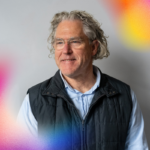
Co-founder of the Kvarken Space Center
Closing up this month´s leap year with February´s #researchfeatures, we welcome Kendall Rutledge.
Kendall Rutledge is our Research Program Manager for Space at the University of Vaasa, Finland. He has expertise in remote sensing algorithm development and validation, ocean surface/atmosphere observations, and summaries relying on reanalysis data from ESA (ERA5) and NASA (MERRA2), particularly related to atmospheric and climate sciences.
Rutledge’s career has spanned medical, environmental, and climate research in the US and Finland, including roles at Eastern Virginia Medical School (Norfolk, Virginia, USA) and with several NASA contractors. He is a founding member of the Kvarken Space Center at the University of Vaasa, where he supports project development activities within the Digital Economy Research platform.
His current work focuses on integrating environmental science aspects with socio-economic processes using remote sensing approaches. His specific interests currently involve promoting the use of biodiversity metrics for societal, business, and regional economic awareness / evaluation.
Educational background for Rutledge includes a M.Sc. in Marine Ecology with a minor in Biostatistics from Old Dominion University, Norfolk, Virginia, USA, a B.A. in Environmental Sciences, and a B.S. in Terrestrial Ecology from Lenoir-Rhyne University, Hickory, North Carolina, USA.
His expertise, experience and research interests position him well to infuse environmental perspectives into the socio-economic processes studied at University of Vaasa and support the research team at the Kvarken Space Center.
From Kendall:
“My most interesting career project involved supporting NASA’s CERES earth radiation budget process. This climate science project still operates today towards better understanding the details of how solar radiation interacts with the Earth system. My small part, I lead a team which worked alongside theoreticians to validate coupled atmosphere/ocean optics models. Our progress helped reduce the uncertainties associated with remotely sensed radiation quantities of optically complex ocean waters.”
“The most complex process I’ve worked is connected with our current work at the Kvarken Space Center. Science is primarily about understanding nature and simply put, summarizing biodiversity accurately is not presently possible on large spatial scales. Many proxies exist to suggest how biodiversity changes in space and time, but the present accountings are just our current best suggestions. This being the case, exactly how to efficiently restore biodiversity loss in relation to past and future socio-economic processes has no clear/efficient path forward”
Hello Mahmoud Elsanhoury!
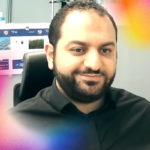
Among the Top 10 Young Scientists from Finland Accepted to Singapore´s Reputed Global Young Scientists 2024 Summit
My name is Mahmoud, I am an Egyptian national working as a doctoral researcher, university teacher, and a research project manager at the University of Vaasa, Finland. I am interested in satellite-based positioning systems, that stemmed from my passion towards space technologies. As a wireless technology researcher, I work closely with satellite-based positioning via global navigation satellite systems (GNSS) and low Earth orbit (LEO) satellite constellations. We utilize computer science tools (e.g. algorithms and sensor fusion) to improve the accuracy and reliability of the various positioning systems. LEO positioning, navigation, and timing (LEO-PNT) is an emerging research topic that gained much potential over the past few years. Both GNSS and LEO-PNT technologies offer a large variety of applications that can be harnessed for location-aware services. In addition, LEO-PNT can be used as an alternative in regions where GNSS signals are impaired, also as an SoS service when needed.
Meet Shakila Bu-Pasha ⚖️

Our Space Lawyer
supporting the development of outer space policy, strategy, and industry
As a member of the ECSL – European Centre for Space Law, Shakila Bu-Pasha is dedicated to the upcoming European Union (EU) and international space law and policy activities. Her commitment extends to promoting legal research and building strong networks in the space law domain. Space law has become a top priority for the EU Commission in 2024, Shakila’s research interest in the regulation of space big data for a secured space economy is pertinent and has the potential for significant economic and sustainable impacts while advancing legal sciences.
Building upon her previous expertise, Shakila currently works as a Project Manager under the Digital Economy platform at the University of Vaasa. Her research intends to focus on how access to and use of satellite data should be lawfully conducted and managed to ensure security within the space sector. More specifically, it intersects data protection and space law with digital business. Aligned with the EU’s recent space strategy and space program (2021–2027), which aims to establish EU leadership and autonomy in space, Shakila’s research considers current EU Space Law (EUSL) initiatives, with a special emphasis on Regulation (EU) 2021/696. This regulation is a new and crucial piece of legislation unfamiliar to many scholars, applying retroactively from January 1, 2021, as a matter of urgency.
Recognizing the distinct nature and specialty of space-related data and its connection to other data, Shakila envisions advancing the space economy within existing legal frameworks in the context of satellite technologies. Her work complements and supports the activities of the Kvarken Space Center, which serves a significant role not just for Ostrobothnia but Finland and Sweden as a whole in applying space technology for regional economic development and space for sustainability endeavors via space-based businesses, data, and innovation.
Research on this regulatory framework will contribute to establishing a robust and balanced environment for generating and maximizing the utilization of space-based data. Shakila’s work will support the development of space policy, strategy, and industry, particularly in the context of big data use and the outcomes derived from its analysis. Given the novelty of the field, further research is needed, and the findings can positively impact the aforementioned aspects and much more!
